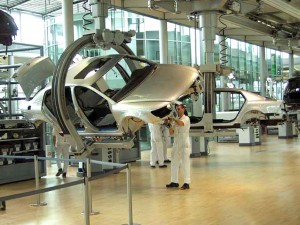Volkswagen AG, Europe’s largest automaker, has agreed to give its German workers a pay increase of 4.3%, following the pattern set last month at Daimler, Porsche and BMW.
Under the one year contract, which expires next June, the pay increase took effect June 1 and covers more than 102,000 employees at VW manufacturing and financial services units.
German employers originally asked for a two-year contract but apparently agreed to the one agree contracts on the assumption negotiators from IG Metall will be willing to reduce demands if the European economy continues to soften over the next 12 months.
The union, however, also won important concessions from VW and other employers in Western Germany for boosting the wages and benefits of trainees, students and temporary workers. Temporary workers also got a 4.3% pay increase as part of the deal.
The employers and the associations that do their bargaining also agreed to new limits on temporary employment that will gradually raise the base wages of the temporary workers. Starting next January, temps will get 80% of full-time pay in the third month on the job, 90% after four months and 100% after 10 months. Previously they had to wait 19 months for full pay.
In addition, after 36 months temps will now be recognized as full-time employees, which automatically makes it more difficult to be laid off under German labor law. IG Metall estimated 3,000 temporary workers will become full-time employees within the next year, which could substantially alter VW’s fixed costs in Germany.
Also, co-op students and trainees will get raises under the terms of the agreement, which the union described as a success.
The pay increase at VW, Daimler and BMW is described as Germany’s biggest industrial pay increase in 20 years.
German automakers had thrived in recent years under changes in German labor law that had made it easier for them to use more temporary workers. During the current round of bargaining, however, IG Metall had demanded more restrictions on the use of temporary employees.
The wage deal, which is more than double Germany’s inflation rate of about 2%, will give some 3.6 million engineering workers a significant raise and was blessed by the German government of Angela Merkel because of its potential to help stimulate the overall German economy, the largest and most dynamic in Europe.
It will be the biggest annual increase since IG Metall won a 5.4% pay rise in 1992, according to union officials.
The size of the deal is a signal that Germany is willing to tolerate higher wages, even if that pushes up inflation, in order to help weak euro members on Europe’s southern periphery, observers said.


This sounds like the GM strategy of the 90’s to do whatever was necessary to keep the full-size truck and SUV lines running …propping up EuroSocialism this way seems politicially adept but economically unsustainable absent a like amount of productivity improvement.
Remember: There’s no “I” in team, but there is one in “ruin.”
I won’t get into politics with you, Ragtop but a couple thoughts: Germany has the strongest economy in Europe and most metrics is significantly past the U.S. (income, health, education, etc.); also, VW recently announced a significant new product development strategy that is expected to slash time to market, production costs, etc., while raising productivity, substantially. Meanwhile, after long holding the gap between worker and management wages to a fraction of the gap in the U.S., German top managers have seen their own pay packages increase several-fold since the Daimler-Chrysler “merger of equals,” so workers are still lagging well behind the gains of management. One can clearly question such an aggressive IG Metall wage hike but it’s also worth raising the flip side of the argument.
Paul A. Eisenstein
Publisher, TheDetroitBureau.com
I agree, Paul. If this is the German idea of “austerity”, as forwarded so many times by Merkel, maybe the UAW ought to be standing outside the gates of the Chattanooga plant, passing out flyers about what the VW workers’ counterparts in Germany are receiving, and propose that the American, low-wage VW “associates” (I love that term) should share in some of that “austerity.”
Nothing like the U.S. being considered a low-wage, third-world country in terms of wages anymore, much in the same way we have always thought of Mexico.
Well, the rich guys bought Wisconsin last night, so I guess that cements austerity for all of the rest of us in place in the U.S. That pretty well sealed the deal against unions and what’s left of the middle-class in this country; just hope the unions in Europe are paying attention to what happens when conservatives rule the governments and the financial world that controls the government.